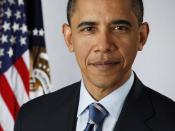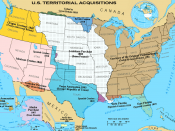The United States finished a time period of Manifest Destiny, followed by Civil War. We realized we had to become part of the global empire in order to continue to prosper. Expansionism awakened in a new form-overseas expansion. A concern over foreign affairs had erupted in the United States.
In the last years of the nineteenth century there was very little potential for territorial growth on the North American continent. As a result U.S. expansionism moved into a new phase. In the past, the nation had generally annexed land adjacent to its existing boundaries. (1)Between the Civil War and 1900, the U.S. began its apprenticeship as an imperial power. As early as the 1850's, the U.S. was sending troops to Argentina, Nicaragua, Japan, Uruguay and China, as well as eyeing sugar rich Cuba for annexation purposes. The latter half of the Nineteenth Century was spent in industrialization and the installment and maintenance of a social order that would prove beneficial to capitalist expansion and progress.
The frontier was eclipsed as a horizon of possibility and identity. As a reminder of its new found, national sense of self, the country's huge State Department building was built next to the White House inaugurating an age of administrative self-consciousness as a world player. (2)However, the expansionism of the 1890s, involved controversial foreign policy tactics that resulted in America acquiring lands outside of the continental United States. America found itself in a race with England, France, and Germany to bring the underdeveloped world under control.
Many people in America thought that the United States and the Anglo-Saxon race had an obligation to take over nations and people that was weak and less civilized. Americans also felt that the economic future of the United States depended on the country expanding its holdings in the world.


